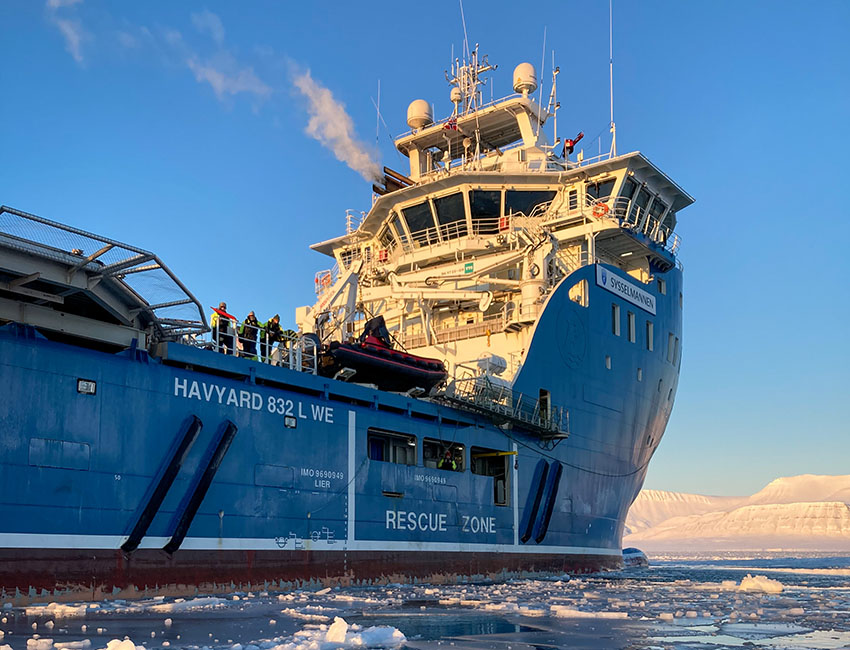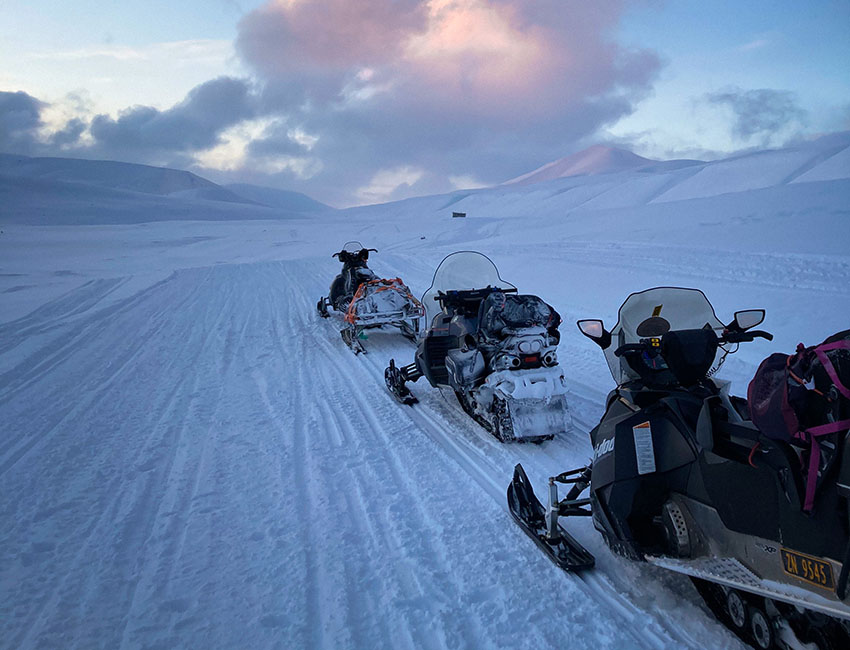Study opportunities in the Arctic

Ute i felt med notatblokken. Dette semesteret studerer Julie et teknologifag om sjøis og instrumentering på sjøis. Hun har tidligere studert polarmetrologi og polaroseanografi, atmosfære, snø og isbreer, og blir ferdig med en bachelorgrad i Klima-, atmosfære- og havfysikk til sommeren.
Top image: Julie Sortland (25) from University of Bergen studies Ice Mechanics, Loads on Structures and Instrumentation at UNIS during the spring semester 2021. She will complete her bachelor degree in Climate-, atmosphere- and ocean physics this summer. Photo: Tomi Vainio
Unique fieldwork, wild nature outside your doorstep and a vibrant, international study environment are some of the things that await you as a student at the University Center in Svalbard.
12 April, 2021
Text: Maria Philippa Rossi
“I have always been fascinated by nature and tried to understand it. In that sense, Svalbard is a very special place to study. The nature on Svalbard captivates most people, and it is a unique opportunity to combine theory and practice.”
She explains that the Svalbard wilderness was an important factor when she chose to study in Longyearbyen, but the good study environment has come as a positive surprise.
“UNIS has a warm and inclusive student environment with students from over 40 countries,” she says.
A sanctuary during the pandemic
Julie and some of her fellow students live in a place called Sjøskrenten, close to the university, where about 20 student live together on each floor.
“We each have our own bedroom but share a kitchen. We are considered a cohort, and have social activities, cook together or watch movies. Although we have to deal with some restrictions, it has felt like a little sanctuary to be here in Longyearbyen during the pandemic.”
This is Julie’s third semester at UNIS, and she highlights the unique opportunities to go on fieldwork and research trips.
“I’ve gotten new motivation for the subject when I have been involved in collecting and analyzing the data.”
Julie is enrolled in a bachelor’s degree at University of Bergen, and many of the teachers from Bergen are connected to UNIS.
“They have been to Svalbard and conducted research here and have talked warmly about the studies. In Bergen, the study is very theoretical, so it has been a nice change with a lot of practical teaching in Longyearbyen.”

Bitten by the Svalbard bug
Julie’s friends and family are starting to realize how much she loves it in Longyearbyen and are excited on her behalf.
“They see how much I enjoy Longyearbyen, and everything I do, and they have started joking about me staying here. I had not expected that I would enjoy Longyearbyen so much, but I become more and more fond of the place every day.”
“There is something about the polar regions that is very fascinating. Since I’m also a big fan of snow, mountains and the winter, and I enjoy being outside, well, then it’s the perfect place to study. I’m probably bit by the Svalbard bug.”
She tries to be outside as much as possible and loves going on snowmobile trips. Julie uses snowmobiles for both field work and cabin trips with fellow students.
“Many cabins have a sauna, we swim in the ocean and make good food, and it’s a very cozy experience.
You need to experience the midnight sun! It can be difficult to sleep, but the sunny winter season offers many opportunities to be active. Julie adds that every season has its charm.
“The first semester I was here was in the fall and it was also a very nice time. We went hiking, there was a lot of focus on having a good time as it got darker, people lit candles and made cakes at the student housing,” Julie says.

A place of study for everyone
You do not have to be super active to enjoy Svalbard, but Julie recommends that you are willing to try new things.
“I have always loved being outdoors, but I have never gone on the wildest trips or expeditions. I have tried a lot of new things on Svalbard, and pushed my own boundaries, and I’ve enjoyed it a lot.”
She says that the natural hazards everyone on Svalbard has to deal with can be challenging, but all students participate in a safety course prior to each semester.
“I have learned to travel in landscapes that can be dangerous if you do not make the right decisions. I have shot with a rifle, learned about avalanches, crossing glaciers and how to avoid going through sea ice. It has been challenging, but I have learned a lot from it!”
Read more about studies in Arctic Technology, and apply before the deadline April 15, 2021.